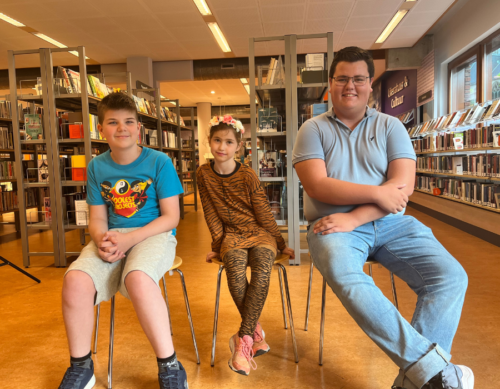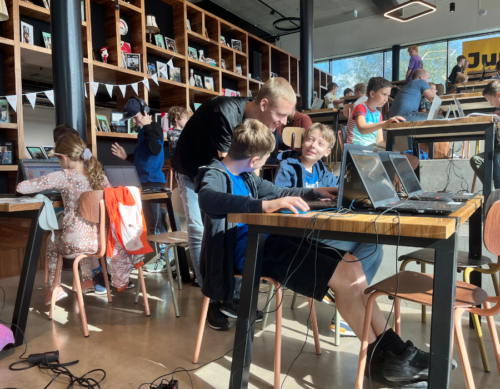
30th July 2024
Benefits of youth mentoring – Three children’s experiences
CoderDojo is all about providing learning opportunities for young people. As we celebrate thirteen years since the first ever Dojo event, we’re shining a spotlight on the experiences of three youth mentors from Greece, as well as the benefits of peer-mentoring within CoderDojo.
Youth mentoring benefits everyone
Having youth mentors in your Dojo offers a unique opportunity: it creates peer-to-peer relationships that positively impact both your Ninjas and your youth mentors by helping them gain invaluable skills and experiences.

Benefits for Ninjas
Youth mentors benefit the Ninjas they support by:
- Helping them understand coding concepts by using language and examples that are more relatable to them
- Providing Ninjas with more relatable role models, and demonstrating positive behaviours and attitudes
- Developing their social skills, such as communication, empathy, and cooperation
- Building confidence: positive reinforcement from mentors close to their age can boost the self-esteem and confidence of Ninjas
Benefits for youth mentors
The youth mentors themselves benefit as well by:
- Developing leadership skills like active listening, clear communication, and problem solving
- Gaining a sense of responsibility by being part of the volunteer team running the club
- Gaining new understanding: youth mentors learn new ways of thinking about coding issues, as well as learn to empathise with Ninjas’ challenges

Panagiotis’ experience
Panagiotis is a 12-year-old youth mentor at his local Dojo. His passion for helping other children with programming inspired him to become a mentor to his peers. “I love helping other children, especially with programming. I feel happy mentoring and this motivated me to code even more.”
One thing he found challenging was when children didn’t understand something, like a coding concept. He overcame this by slowing down, relaxing, and explaining it “to them more playfully”. Keeping Ninjas engaged was not a problem, “many times I [show] them some additional Scratch commands and characters” and this keeps them motivated to learn more!
Panagiotis’ advice to other young people thinking of mentoring is to “be calm, talk calm[ly], and play with coding” instead of approaching it too seriously.
Aggelos and Harris’ experience
This year, CoderDojo Votanikos separated their events into two sessions. The first ran from 16:30 to 17:30 for younger children and the second from 17:30 to 18:30 for older children.
Although they attended the later session, Harris (12) and Aggelos (11) arrived at CoderDojo Votanikos in time for the earlier session as their father mentors at both sessions. They decided to become youth mentors to do something productive with this time. “Instead of sitting and waiting, we preferred helping the other children.”
Harris and Aggelos were eager to support the younger children and found their biggest challenge was “when nobody needed help and we just sat there waiting to help”.
The boys have this advice for keeping young people motivated even when they encounter bugs: “When the code does not work and the children feel sad about it, the best you can do is first cheer them up.”
In terms of the qualities they think youth mentors should have, Harris and Aggelos shared this: “They should know Scratch or Python better than the children they want to help, they should be able to get their message across, and not be shy.”
Thank you to Panagiotis, Aggelos, and Harris for sharing their insights and for volunteering their time and skills to help other children learn to create with code!